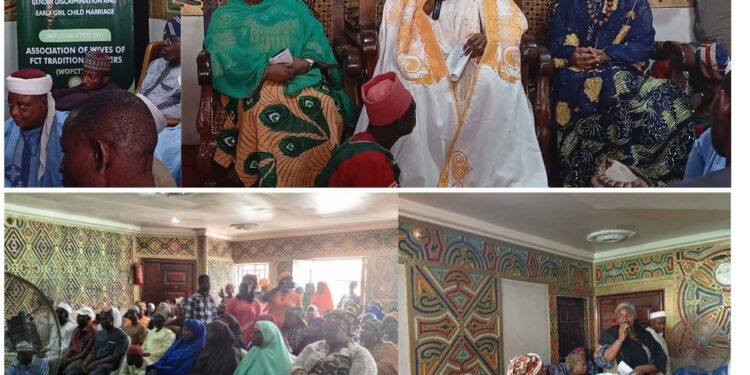By Queen Kunde
In a bold move to end harmful cultural practices and champion the rights of women and girls, wives of traditional rulers in the Federal Capital Territory (FCT) have taken the fight against gender-based violence and early marriage to the grassroots.
At a high-impact community outreach in Abaji Area Council, the women under the auspices of the FCT Traditional Rulers’ Wives Association joined forces with the FCT Women Affairs Secretariat to lead a robust advocacy campaign focused on gender justice, girl-child education, and women empowerment.
The campaign, which drew women from across rural communities, featured impassioned dialogue, awareness sessions, and practical guidance on tackling abuse and discrimination.
President of the Traditional Rulers’ Wives Association, Hajia Hauwa Ibrahim Adamu, said the movement is rooted in the belief that “When we educate the woman, we empower the family. When we protect the girl child, we secure the future.”
“Our women must not remain silent in the face of abuse,” she declared. “The time to rise is now.”
Representatives from all 17 chiefdoms, including Mrs. Gloria Ayedoo, wife of the Etsu of Kwali, echoed a united message: “Enough is enough.” The women emphasized dignity, safety, and justice as non-negotiable rights for every girl and woman.
Dr. Adedayo Benjamins-Laniyi, Mandate Secretary of the FCT Women Affairs Secretariat, reaffirmed the government’s commitment to scaling advocacy across all six Area Councils. She said the outreach is aligned with the Renewed Hope Agenda of President Tinubu’s administration.
“Through the Renewed Hope Agenda, we are delivering structured interventions that include awareness, education, empowerment, and access to justice,” she said. “No woman will be left behind.”
The traditional institution also pledged full support. His Royal Majesty, Baba Yunusa Adamu, the Ona of Abaji, lauded the initiative and called on other traditional leaders to take a stand against harmful practices.
“As custodians of culture, our role is to protect, not to oppress. These women have our full support,” he said.
The event brought together a diverse coalition of stakeholders including religious leaders, youth advocates, women leaders, persons with disabilities, and justice sector representatives all united by a single purpose: to protect and empower women and girls in every corner of the FCT.
With voices rising from within the royal households, and actions reaching the heart of rural communities, the campaign against gender violence in the FCT is no longer symbolic it is a movement in motion.


